Effect in Biology
In biology, the term "effect" refers to the result or impact of a specific cause or stimulus on an organism, process, or system. Effects can be observed at various levels of biological organization, from the molecular and cellular levels to the organismal and ecological levels.
Types of Effects
There are several types of effects in biology, including:
- Biological Effects: These are the effects that occur within living organisms as a result of internal or external factors, such as changes in gene expression, physiological responses, or behavior.
- Ecological Effects: These are the effects of a particular factor or event on an ecosystem, including changes in population dynamics, species interactions, and ecological processes.
- Environmental Effects: These are the effects of environmental factors, such as pollution, climate change, or habitat destruction, on living organisms and ecosystems.
- Therapeutic Effects: In the context of pharmacology and medicine, these are the intended beneficial effects of a drug, treatment, or intervention on a patient's health or well-being.
Factors Influencing Effects
Several factors can influence the effects of a cause or stimulus in biology, including:
- Genetic Factors: Variations in genetic makeup can influence how organisms respond to external stimuli and environmental factors.
- Environmental Factors: The surrounding environment, including abiotic and biotic factors, can impact the responses and effects observed in living organisms.
- Temporal Factors: Effects can vary over time, with short-term and long-term consequences of a particular cause or stimulus.
- Dosage/Intensity: The magnitude or concentration of a stimulus can affect the nature and extent of its effects.
- Interactions: Complex interactions between multiple factors can lead to synergistic, antagonistic, or cumulative effects on biological systems.
Studying Effects in Biology
To study effects in biology, researchers employ various experimental approaches and methodologies, including:
- Observational Studies: Observing and documenting natural phenomena and their effects on organisms and ecosystems.
- Experimental Manipulations: Conducting controlled experiments to test the effects of specific variables on biological systems.
- Molecular and Cellular Analyses: Investigating the molecular and cellular mechanisms underlying biological effects, such as gene expression, signaling pathways, and metabolic responses.
- Population and Community Surveys: Assessing the effects of environmental changes on the abundance, distribution, and interactions of species within ecosystems.
- Clinical Trials and Epidemiological Studies: Evaluating the therapeutic effects of interventions and the impact of diseases on human populations.
Key Concepts for Understanding Effects
When studying effects in biology, it's important to understand key concepts such as:
- Homeostasis: The ability of organisms to maintain internal stability and balance in the face of changing external conditions and stimuli.
- Adaptation: The process by which organisms evolve traits and behaviors that enhance their survival and reproduction in response to environmental pressures and effects.
- Trophic Interactions: The feeding relationships and energy transfer pathways that underpin the effects of species interactions within ecosystems.
- Feedback Mechanisms: Regulatory loops and responses that modulate the effects of biological processes and maintain equilibrium within living systems.
Understanding the diverse effects in biology is essential for comprehending the dynamic interactions between living organisms and their environments, as well as for addressing critical issues related to human health, conservation, and sustainability.
Study Guide
To effectively study the concept of "effect" in biology, consider the following study guide:
- Define the term "effect" in the context of biology and provide examples of biological, ecological, and environmental effects.
- Discuss the factors that can influence the effects of a cause or stimulus in biological systems, including genetic, environmental, and temporal factors.
- Explain the different experimental approaches and methodologies used to study effects in biology, such as observational studies, experimental manipulations, and molecular analyses.
- Explore key concepts related to understanding effects, including homeostasis, adaptation, trophic interactions, and feedback mechanisms.
- Consider real-world examples where an understanding of biological effects is crucial, such as in the context of disease outbreaks, environmental disasters, or conservation efforts.
By engaging with these study guide topics and actively exploring the diverse effects in biology, you can develop a comprehensive understanding of the intricate relationships between organisms, their environments, and the consequences of biological interactions and processes.
[Effect] Related Worksheets and Study Guides:
.◂Biology Worksheets and Study Guides High School. Nucleic acids and protein synthesis
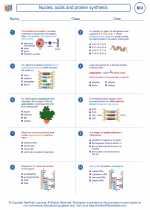
 Worksheet/Answer key
Worksheet/Answer key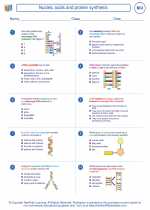
 Worksheet/Answer key
Worksheet/Answer key
 Worksheet/Answer key
Worksheet/Answer key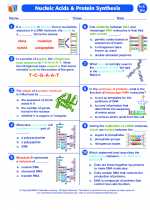
 Vocabulary/Answer key
Vocabulary/Answer key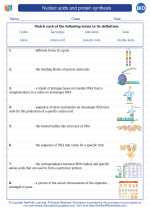
 Vocabulary/Answer key
Vocabulary/Answer key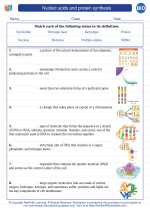
 Vocabulary/Answer key
Vocabulary/Answer key
